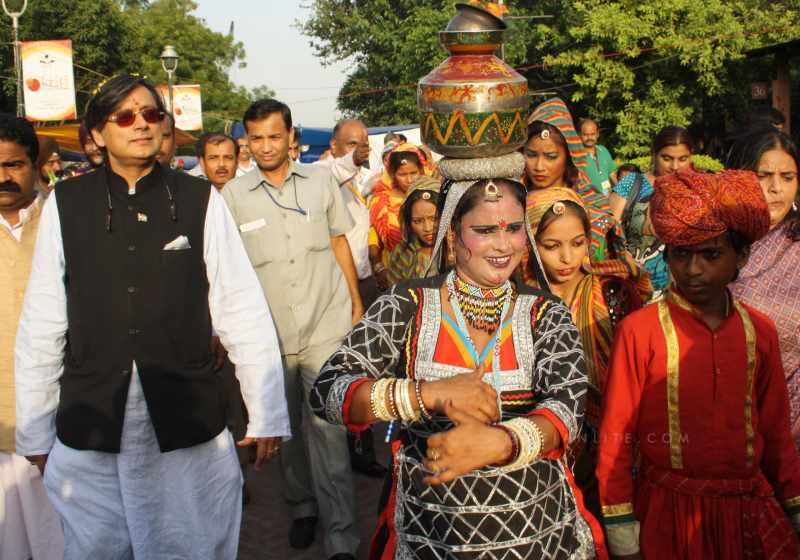Ranjana Narayan talks to Dr Shashi Tharoor MP, former Deputy secretary general of UN and a former minister of India. Dr Tharoor feels Modi’s style of governance would soon bring out the “strengths and limitations of one-man rule”.

Prime Minister Narendra Modi’s image as a decisive leader, of a “man on a white stallion”, may have clicked with the masses fed up with the perceived indecisiveness of the UPA, but Congress MP and former minister Shashi Tharoor feels Modi’s style of governance would soon bring out the “strengths and limitations of one-man rule”.
Tharoor also admitted that while the Congress had been “prepared for a defeat at some level” it was not prepared for the scale of the drubbing or even the BJP’s “truly astonishing” victory in the Lok Sabha polls.
The two-time MP from Thiruvananthapuram said Modi’s style of governance, where he met with secretaries separately without the presence of ministers, “raises some real questions about the entire principle of cabinet accountability in our system”.
“In our system, normally the ministers are responsible for their portfolios, they are responsible not only to the PM but also parliament. When we ask questions of the minister we assume we are asking questions to somebody who had made the policies that we have questioned.”
“If we are going to be in a government in which the policies are actually made by the PM with the bureaucrats, then the very principle of cabinet accountability and parliamentary system of government gets thrown into question,” Tharoor contended.
The Congress party, in contrast, “has a very strong bench of qualified and competent leaders and policymakers, as well as an approach that is collegial and consultative in making decisions”, which he feels would regain appeal with the people.
Asked if the Congress’ stunning defeat, its poorest showing ever, could be laid at the doors of the party high command – Congress president Sonia Gandhi and her son and vice president Rahul Gandhi – Tharoor said “any one explanation would be difficult to give, there were clearly a number of factors that affected the electoral results.”
He enumerated anti-incumbency, the fuel and food price hike, which did not go down well with the people, and the “corruption saga”.
“Local political factors that varied from place to place” also played a part in the defeat as well as Modi’s development plank.
“I think that for a glib analysis that blames one leadership or one family or one particular principle is simply not right. There are too many other factors at play that all had an impact in making people’s minds up,” said Tharoor.
“Nobody quite expected us to do so badly, we were prepared for a significant reduction from 2009 and prepared for defeat at some level; but we were neither prepared for the scale of the numbers we got nor for the fact that the BJP will actually win a majority by itself. That was truly astonishing and in many ways a remarkable triumph for the Narendra Modi campaign.”
“In the current mood of the nation, the Modi style of message of a decisive leader resonated well with the voters. In time, which may even be within five years, I think the alternative style of leadership embodied by the Congress party, which is consultative, which is inclusive, which is empowering, which is collective and is not one man knowing it all, doing it all – that alternative style of leadership may appeal to the people,” Tharoor said.
He said the Congress president and vice president have been meeting leaders from all sections and all parts of the country to understand what went wrong electorally, and that senior leader A.K. Antony is to head a small group to “come out with a formula for moving forward”.
On reviving the Congress party, Tharoor said that “the party definitely will have to revive; I do believe that the Kerala model might actually work well, the party is extremely well organised, it has a detailed structure going down to the grass roots” with committees at the booth and block level where the Congress party “practises politics as an extension of social work”.
The Congress workers in Kerala help the people with their problems, like getting pension, helping with police complaints, getting a BPL card, helping in case of illnesses.
“I think that that connectivity has to some degree been lost in some parts of India, and if the party can regain that connection with people at the very grassroots, and become a service organisation and not only an election fighting machine, then I think we will revive.”
On the Congress party’s strategy for the parliament session, Tharoor said it “depends on what the government comes up with. We will very clearly question the choices and priorities in preferences of the new government, when necessary. But if they come up with things we don’t agree with, we will question them.”
“But equally we will also remind them of the positions they took when they take new positions now that are at variance with their own. The rail hike is a particularly classic example,” he said, citing Modi’s speeches and letter to former prime minister Manmohan Singh criticising the UPA’s hike in rail fares.